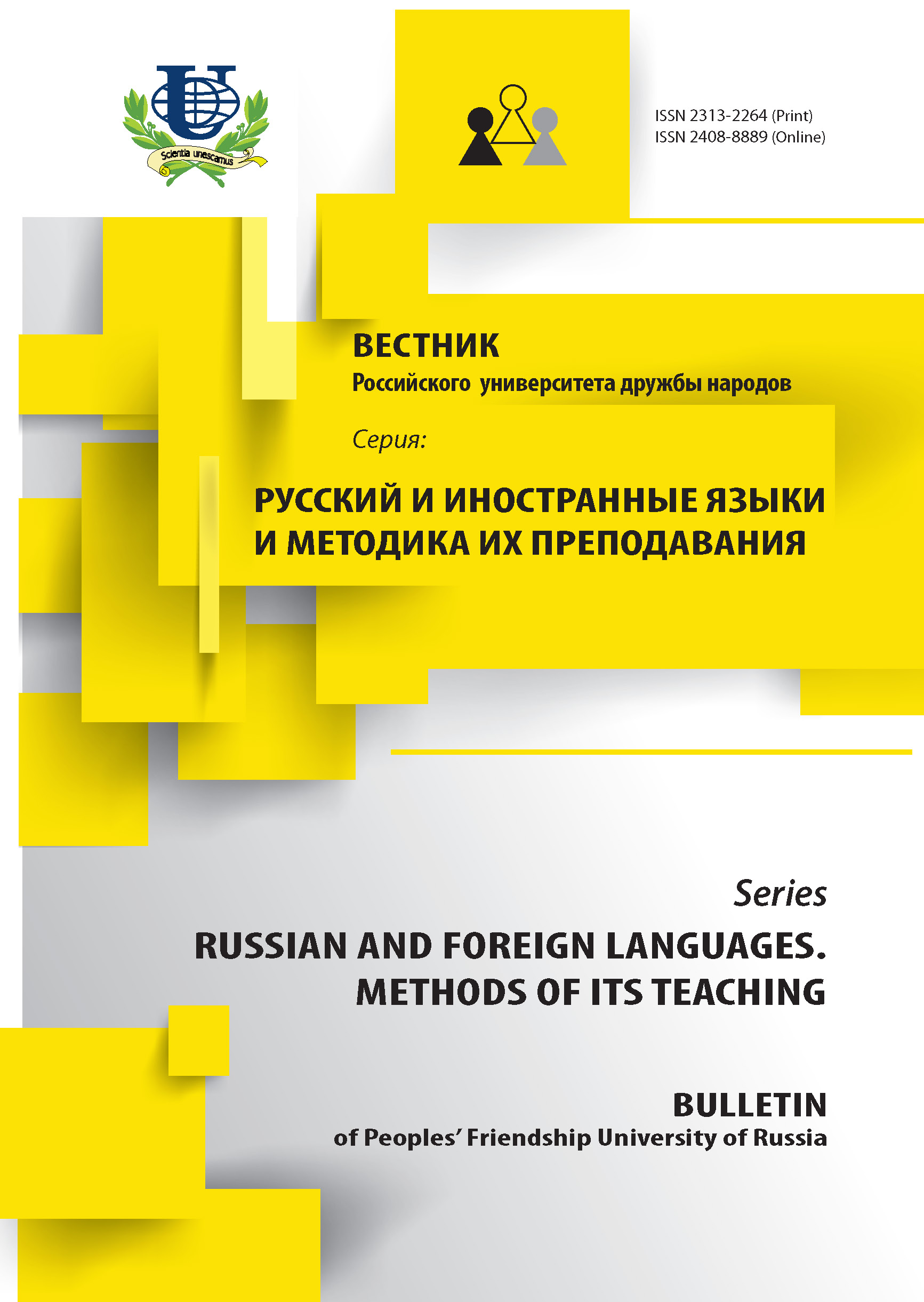No 2 (2012)
- Year: 2012
- Articles: 22
- URL: https://journals.rudn.ru/russian-language-studies/issue/view/608
Articles
 5-12
5-12


Comparative Linguaculture as a New Scientific Trend
Abstract
The article is dedicated to the observation of comparative linguaculture as a new scientific trend, its subject, object, goals and research tasks. It is stated that this trend has appeared on the basis of linguaculture and comparative linguistics and compare languages and cultures through the native language. The main principles of comparative research - contrastive and comparative are also stated in the article.
Russian Language Studies. 2012;(2):13-18
 13-18
13-18


Linguistic and Culturological Analysis Of Caricature Texts
Abstract
The article is devoted to actual problems of studying caricature texts. The article deals with theoretical and methodical issues of making annotations to those texts; we also analyse the notion linguistic cultureme in linguistic culturology as the unit with linguistic and cultural meaning and its functioning in Russian caricatures.
Russian Language Studies. 2012;(2):19-24
 19-24
19-24


 25-29
25-29


 30-34
30-34


Causality as a Type of Semantic Relations in Media Discourse
Abstract
The article investigates causality as one of the major semantic types in discourse. Formal explicit means help to form cause effect relations in discourse. The ways of verbalization of implicit causal meaning is also under focus of the paper.
Russian Language Studies. 2012;(2):35-40
 35-40
35-40


Comparative Analysis of Foreign Language Vocabulary Expansionin Modern Russian and Chinese Newspapers in Terms of Creating Intercultural Media Discourse
Abstract
This article studies foreign vocabulary expansion in modern Russian and Chinese newspaper articles in the aspect of building intercultural media discourse. The research allows us to identify the common features of the process in the above-mentioned languages. These common features help to enhance mutual understanding and expand international contacts.
Russian Language Studies. 2012;(2):41-46
 41-46
41-46


Features and Criteria for Literary Text Translation
Abstract
The article reviews the main features of a literary text as an object of translation activities, defines the main difference between translation of a literary text and other types of translation, adopts the basic criteria and methods of literary translation, and investigates the role of a translator and the formation of a world view in the translation of literary texts.
Russian Language Studies. 2012;(2):47-52
 47-52
47-52


 53-59
53-59


To the History of Order as a Special Type of Document
Abstract
In the article the formation of terminological meaning of the word orderon the basis of lexicographic sources in the Russian language is considered. The peculiar use of the words corresponding with the given kind of document indifferent historical periods is traced.
Russian Language Studies. 2012;(2):60-65
 60-65
60-65


Use of Feature Films in the Course of Formation Communicative Competence and Linguistic and Cultural Adaptation of Foreign Students
Abstract
The article aims to study some aspects of foreign students' speech communicative competence development in Russian language learning. Movies (or feature films) have potential benefits to provide social, linguistic and culturological adaptation of foreign students in Russian-speaking surrounding.
The experiment discovered and confirmed positive outcomes of using movies in foreign students education, for encouraging their various communicative competences, further linguistic proficiency and country knowledge.
Russian Language Studies. 2012;(2):66-72
 66-72
66-72


 73-79
73-79


Actualization of the Universal Concept Leadership in Russian Conceptual Sphere of a New State Administration
Abstract
The article is focused on the investigation of Leadership concept, which is universal for linguistic group structures. The concept is connected with the realization of traditional, hierarchical, and management principles reflecting the interacting specificity of state power branches. Special attention is given to the lexemes representing the concept. Transformations in their semantics determine the frequency growth and consequently influence the frequency in the usage of the analyzed concept.
Russian Language Studies. 2012;(2):80-85
 80-85
80-85


 86-92
86-92


 93-97
93-97


 98-102
98-102


Some Aspects of Listening in Professional Language Training
Abstract
Mastering professional language requires activation of specialized vocabulary and terminology and the assimilation of certain structures in such communication activities as listening to lectures on special subject, reading textbooks and professional conversation. This article attempts to provide the system of exercises, as well as identify methods of language teaching, which are associated with special tasks of teaching professional language.
Russian Language Studies. 2012;(2):103-108
 103-108
103-108


 109-118
109-118


Realization of Competent Approach in Pupils' Speech Development in Studying Metaphor
Abstract
The article within the frame of modern competence approach to native language teaching validates the efficiency of the key competence building in the process of metaphor studying as a polyfunctional phenomenon of mentality, the language and speech. According to this, the contents of linguistic, communicative, and aesthetic competence are specified. The level of their development defines the speech development level of the pupils. The article deals with methods, ways, and types of exercises used in experimental work on metaphor studying in the 5th and 8th forms. The exercises ensured the process of the significant competence building which was mentioned above.
Russian Language Studies. 2012;(2):119-124
 119-124
119-124


 125-129
125-129


A.A. Atabekovа. Legal Translation in an Interdisciplinary Context
Russian Language Studies. 2012;(2):130-132
 130-132
130-132


Our Authors
Russian Language Studies. 2012;(2):133-135
 133-135
133-135















